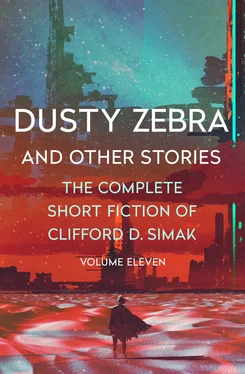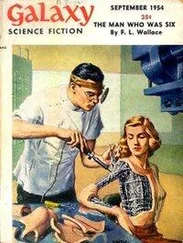And there was a snarling and a coughing sound of anger and Harrington found himself moving toward the alien thing with his fingers spread and his muscles tensed for the seizing and the rending of this enemy from the darkness that extended out beyond the cave. He was shambling forward on bowed and sturdy legs and there was fear deep-rooted in his mind, a terrible, shriveling fear that drove him to his work. But above and beyond that fear there was as well the knowledge of the strength within his own brute body.
For a moment he was aghast at the realization that the snarling and the coughing was coming from himself and that the foam of fighting anger was dripping from his jaws. Then he was aghast no longer, for he knew with surety who he was and all that he might have been or might ever have thought was submerged and swept away in sheer bestiality and the driving urge to kill.
His hands reached out and caught the alien flesh and tore at it and broke it and ripped it from the bones, and in the wild, black job of killing scarcely felt or noticed the raking of the other’s talons or the stabbing of the beak.
There was a screaming somewhere, a piercing sound of pain and agony from some other place, and the job was done.
Harrington crouched above the body that lay upon the floor and wondered at the growling sounds which still rumbled in his throat.
He stood erect and held out his hands and in the dim light saw that they were stained with sticky red, while from the pit he heard Harvey’s screams dwindle into moaning.
He staggered forward to the railing and looked down into the pit and streams of some dark and stringy substance were pouring out of every crack and joint of Harvey—as if the life and intelligence were draining out of him.
And somewhere a voice (a voice?) was saying: You fool! Now look at what you’ve done! What will happen to you now?
“We’ll get along,” said Harrington—ordinary Harrington, not the final gentleman, nor yet Neanderthaler.
There was a gash along one arm and the blood was oozing out and soaking the fabric of his torn coat and one side of his face was wet and sticky, but he was all right,
We kept you on the road, said the dying voice, now faint and far away. We kept you on it for so many ages…
Yes, thought Harrington. Yes, my friend, you’re right. Once the Delphian oracle and how many cons before that? And clever—once an oracle and in this day an analytical computer. And where in the years between—in monastery? in palace? in some counting house?
Although, perhaps, the operation need not have been continuous. Perhaps it was only necessary at certain crisis points.
And what the actual purpose? To guide the toddling footsteps of humanity, make man think as they wanted him to think? Or to shape humanity to the purpose of an alien race? And what the shape of human culture if there had been no interference?
And he, himself, he wondered—was he the summer-up, the man who had been used to write the final verdict of the centuries of patterning? Not in his words, of course, but in the words of these other two—the one down in the pit, the other on this catwalk. Or were there two of them? Might there have been only one? Was it possible, he wondered, that they were the same—the one of them no more than an extension of the other? For when Madison had died, so had Harvey.
“The trouble with you, friend,” he said to the thing lying on the floor, “was that you were too close to human in many ways yourself. You got too confident and you made mistakes.”
And the worst mistake of all had been when they’d allowed him to write a Neanderthaler into that early story.
He walked slowly toward the door and stopped at it for a moment to look back at the twisted form that lay huddled on the floor. They’d find it in an hour or two and think at first, perhaps, that it was Madison. Then they’d note the changes and know that it could not be Madison.
And they’d be puzzled people, especially since Madison himself would have disappeared. They’d wonder, too, what had happened to Harvey, who’d never work again. And they’d find the maul!
The maul! Good God, he thought. I almost left the maul!
He turned back and picked it up and his mind was churning with the fear of what might have happened had he left it there. For his fingerprints would be all over it and the police would have come around to find out what he knew.
And his fingerprints would be on the railing, too, he thought. He’d have to wipe them off.
He took out his handkerchief and began to wipe the railing, wondering as he did it why he went to all the trouble, for there would be no guilt associated with this thing he’d done.
No guilt? he asked himself.
How could he be sure?
Had Madison been a villain or a benefactor?
There was no way, he knew, that anyone could be sure.
Not yet, at least. Not so shortly after. And now perhaps there’d never be any way to know. For the human race had been set so firmly in the track that had been engineered for it, it might never deviate. For the rest of his days he’d wonder about the rightness and the wrongness of this deed he’d done.
He’d watch for signs and portents. He’d wonder if every piece of disturbing news he read might have been averted by this alien that now lay upon the floor. He’d come fighting out of sleep at night, chased by nightmares of an idiot doom that his hand had brought about.
He finished polishing the railing and walked to the door. He polished the knob most carefully and shut the door behind him. And, as a final gesture, he untied the shirt tails.
There was no one in the lobby and no one in the street, and he stood looking up and down the street in the pale cold light of morning.
He cringed against it—against the morning light and against this street that was a symbol of the world. For there seemed to him to be a crying in the street, a crying of his guilt.
There was a way, he knew, that he could forget all this—could wipe it from his mind and leave it all behind him. There was a path that even at this hour led to comfort and security and even, yes, to smugness, and he was tempted by it. For there was no reason that he shouldn’t. There was no point in not doing it. No one except himself stood either to gain or to lose.
But he shook his head stubbornly, as if to scare the thought away.
He shifted the maul from one hand to the other and stepped out to cross the street. He reached the car and opened the back door and threw the maul in on the floor.
And he stood there, empty-handed now, and felt the silence beating in long rolls, like relentless surf pounding through his head.
He put up his hands to keep his head from bursting and he felt a terrible weakness in him. He knew it was reaction—nerves suddenly letting go after being taut too long.
Then the stifling silence was no more than an overriding quietness. He dropped his hands.
A car was coming down the street, and he watched it as it parked across from him a short distance up the street.
From it came the shrilling voice of a radio tuned high:
“… In his note to the President, refusing the appointment, Enright said that after some soul-searching he was convinced it would be better for the country and the world if he did not accept the post. In Washington, foreign policy observers and the diplomatic corps are reported in a dither. What, after all, they ask, could soul-searching have to do with the state department?
“And here is another piece of news this morning that is likewise difficult to assess. Peking announces a reshuffling of its government, with known moderates taking over. While it is too early yet to say, the shift could result in a complete reversal of Red China’s policies—”
Читать дальше












